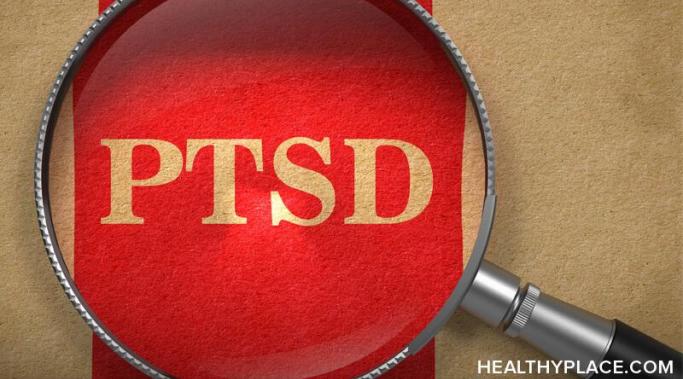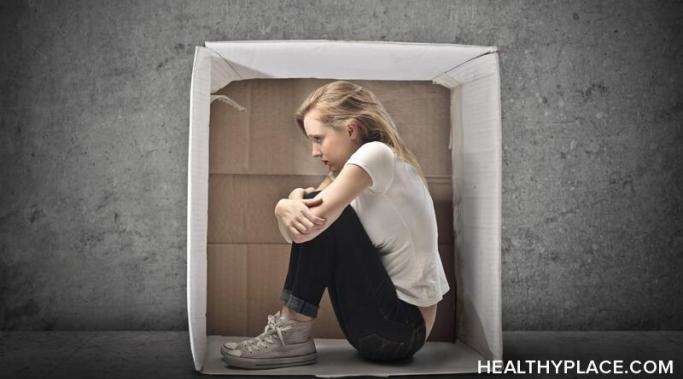There will always be unavoidable triggers on our posttraumatic stress disorder (PTSD) journey. While we can become skilled at avoiding some PTSD triggers, coping with many other triggers, and adept at implementing self-care, there will still be times when our most challenging PTSD triggers are unavoidable.
Trauma! A PTSD Blog
Hi, my name is Elizabeth Brico and I’m the new author of Trauma! A PTSD Blog. You can also call me Betty if you prefer. I've been diagnosed with posttraumatic stress disorder (PTSD) for almost a decade. I developed it in response to domestic violence, which occurred when I was a teenager. HealthyPlace has been a long time refuge for me. I've enjoyed reading the various blogs and articles, especially those pertaining to PTSD. You can imagine, then, that I'm thrilled to be joining the team as one of the authors of Trauma! A PTSD Blog.
When someone who has posttraumatic stress disorder (PTSD) tells you about the illness, she also entrusts you with an important piece of her life. For most people, having PTSD is not something that pops up in casual conversation. Even for someone who has PTSD who is ready to talk about their experience fears the possible unsupportive response. I'm convinced that in most situations, people simply don't know how to react to PTSD disclosures, and are reluctant to ask. Here is what I'd like everyone to about talking with someone who has PTSD.
I have experienced a lot of negative self-talk around my posttraumatic stress disorder (PTSD). Before my PTSD diagnosis and therapy, my daily life was filled with stress and feelings of worthlessness. I had lived with my anxieties, depression, and dissociation for most of my life. I had no frame of reference for what life could be like without these symptoms. I had to reach a point where I was unable to do anything but sit on the couch and obsess over imagined diseases and an untimely death before I sought out a professional. Even then, I had a difficult time allowing myself to heal as if I wasn't significant enough for help. Here are some things I wish I had known about negative self-talk and PTSD when I first began reaching out for assistance.
My memories lost to dissociation come from having experienced prolonged traumatic abuses as a child. I developed the protective reflex of dissociation at an early age. Dissociation was my response to frightening, harmful, and unpredictable environments. I learned to tune out and shut down mentally while still being able to respond to my surroundings to function in the moment. I don't know this because I remember it. I know this because other people hold memories for me. Here is how I began reclaiming my memories lost to trauma-related dissociation.
My posttraumatic stress disorder (PTSD) brain keeps me busy to avoid pain. Your PTSD brain could help you avoid pain in a very different way. The diversity found in the coping mechanisms people develop in posttraumatic stress disorder (PTSD) continues to surprise me. In my case, constant thinking was one way my PTSD brain protected me.
I lived with posttraumatic stress disorder (PTSD) for almost 22 years before I received treatment for posttraumatic stress disorder. After five years of therapy, I healed enough to consider myself living in PTSD recovery. However, I still have symptoms that require maintenance, depression being the most notable. No magic formula exists to cure PTSD, but I have coping skills to manage my symptoms. Let's look at the reality of living in PTSD recovery, and the myth of being cured.
In the field of mental health, the phrase trauma-informed care refers to a set of standards practitioners follow when treating individuals who have experienced trauma. Trauma-informed care reduces the risk of causing inadvertent harm to or retraumatizing people with posttraumatic stress disorder (PTSD). Understanding the basics of trauma-informed care can help you make the most out of your PTSD therapy.
I have a bad habit and it's about posttraumatic stress disorder (PTSD)-related avoidance. I make plans with the best of intentions, only to cancel them at the last minute. Does this sound familiar to you? As many times as this has happened, I continue to experience a disconnect between the willingness to participate in an event when I make plans, and the utter desire to avoid leaving my room when it is time to go. However, I have found that breaking outings into steps reduces PTSD-related avoidance.
It can be difficult to explain posttraumatic stress disorder (PTSD) symptoms to friends, but it helps me to do so. PTSD symptoms include an array of possibilities such as anxiety, depression, panic attacks, difficulty bonding, addiction, insomnia, and dissociation. People experience PTSD in very different ways, based on their trauma history, resilience, supports and a myriad of other factors. So here is why I find it beneficial to explain how my specific PTSD symptoms manifest themselves, and why you might too.









